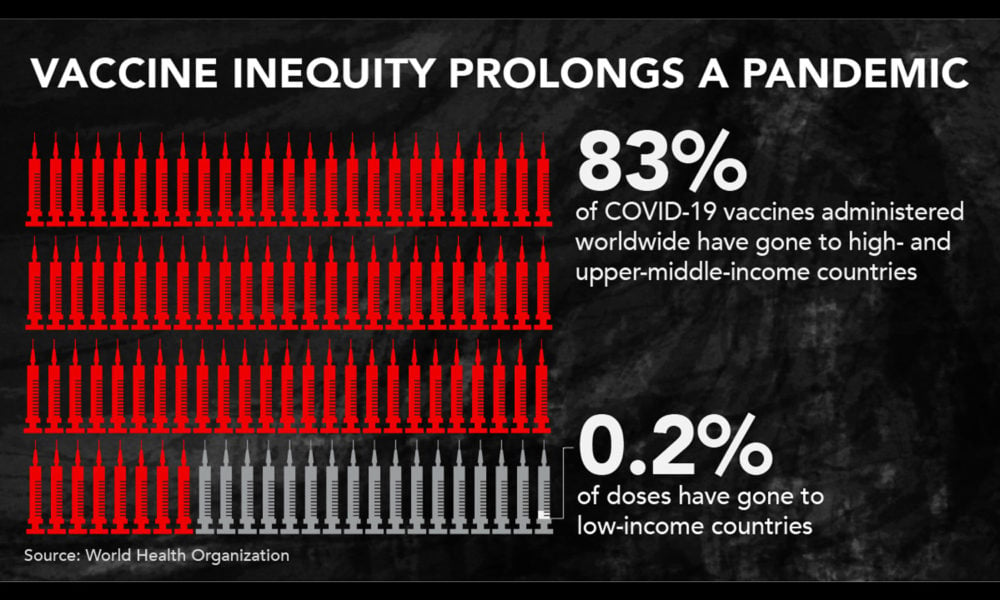UPDATE (May 5, 2021): The US Trade Representative Ambassador Katherine Tai has announced that the US will support the waiver of intellectual property rights protections for COVID-19 vaccines and engage in WTO negotiations to make that a reality. This is great to see and an important step in beginning to address the challenge of global vaccine inequity. We look forward to continued progress on this and other fronts to secure vaccine equity.
Like many of you in the US, I’m looking forward to being fully vaccinated soon. Yesterday I read welcome news that the FDA will soon be approving the Pfizer BioNTech vaccine for children as young as 12-15 years old, meaning my kids could soon be vaccinated too. Summer is looking up for many of us. But meanwhile a terrible and unjust global vaccine inequity looms large, risking millions of people’s lives and threatening our collective ability to overcome this global pandemic. We—the US and other richer nations of the world—can and must do a lot better, and urgently.
The COVID-19 catastrophe rages on
While COVID-19 infections have been waning in much of the US (although we need continued vigilance as hotspots flare), terrifying new waves are unfolding in other parts of the world.
Every morning, I have a habit of checking my WhatsApp messages, catching up on snippets of news from my parents and friends in India. Lately, that morning routine has turned bleak, as India’s devastating COVID-19 crisis worsens. The messages are filled with news of family members who are ill or have died from COVID-19; anguished searches for oxygen, medications, and hospital beds; somber scenes of mass cremations; and desperate worry from those who like me are too far away to be of any help to those we love dearly. Everyone is traumatized.
People in countries in South America, including Argentina, Brazil, and Colombia, are reeling too, as are those in the Philippines, Iran, and Turkey. It’s hard to look at the current world map of COVID-19 cases and feel anything other than deep sadness and anger that this is where we are over a year into the COVID-19 crisis. There’s a lot of blame to go around, including for individual country governments failing their own people in catastrophic ways. But we have also failed on a global scale—and it is a moral failure with profound, and profoundly unjust, public health consequences.

Source: New York Times
Vaccine inequity
While emergency help is desperately needed during these huge surges in disease, we mustn’t lose sight of the imperative to also ensure that as many people across the world are vaccinated as quickly as possible. It has been a triumph of science and the hard work of many, many scientists, doctors, nurses, and other frontline medical professionals that we have so many effective vaccines available and in people’s arms so quickly. But for far too many, that availability is merely theoretical.
According to the World Health Organization, “Of the 832 million vaccine doses administered, 83 percent have gone to high or upper middle-income countries, while only 0.2 percent have been sent to their low-income peers. In high-income countries alone, one in four people have received a vaccine, a ratio that drops precipitously to 1 in 500 in poorer countries.”
Months into the vaccine rollout in many richer nations, that is simply unacceptable and, as some have said, replicating patterns of colonialism. Advance deals that richer countries made with vaccine suppliers have allowed them to secure and hoard vaccines, even as many countries are going without or have had very little access. As just one example, in the continent of Africa overall less than one percent of the population has received even one vaccine dose.
As far back as last September, research from Northeastern University showed that many more lives would be lost if just the richer countries had access to vaccines versus a more equitable global plan. Their modeling showed that 61 percent of deaths globally could be averted if an effective vaccine was distributed to all countries proportional to their populations rather than if the 50 richest countries monopolized the initial 2 billion doses, which would avert only 33 percent of deaths.
Even with that kind of advance knowledge, richer countries have chosen to follow precisely the most inequitable and selfish approach, which WHO Director General Tedros Adhanom Ghebreyesus has called “vaccine nationalism” and others have more forcefully called out as “vaccine apartheid.”
Speed in vaccination delivery is important with a virus that is spreading fast and mutating in worrisome ways. Richer countries should have prioritized vaccine equity from the beginning, and now must accelerate their efforts, both for their own good and for the global good.
The map above is a snapshot of vaccine delivery as of May 3—that kind of inequity is unconscionable. What’s worse, many richer nations like the US have secured far more vaccine than would be needed to vaccinate their entire population and are still not accelerating sharing vaccines with COVAX, the global vaccine initiative. COVAX has delivered only about 43 million doses of vaccine to 119 countries. There have been lots of lessons learned one year into the launch of COVAX, but the primary one remains that countries have simply not contributed sufficient doses to it—money is needed too, but in this acute stage of the crisis even money is no substitute for actual vaccine doses. Sweden has just pledged one million doses for COVAX but 20 million doses are urgently needed in the second quarter of 2021.
A letter signed by over 1,000 public health and other experts states that: Limited vaccine supplies are being allocated by wealth and geography, not by science, public health, or human need. Globally, it is disproportionately affecting Black and ethnic minority communities.
Vaccine inequity is also a challenge right here in the US, as communities of color continue to be vaccinated at lower rates than the white population. Similar racial, political, and economic inequities that have been perpetuated on Black, Brown, and Indigenous communities here in the US, are magnified on a global scale.
Closing the vaccine equity gap
Governments and pharmaceutical companies have to work together to close this vaccine equity gap as soon as possible, working together with the World Health Organization. It’s critical to limiting loss of lives and economic harm. And it’s the only way we can ultimately defeat this virus and end the global pandemic. New and potentially more dangerous variants of the virus will also flourish as long as we fail to vaccinate enough people all over the world.
Piecemeal emergency help is far from sufficient. While it’s welcome news that the Biden administration and US-based companies are providing emergency medical supplies for India, for example, that is far from enough. And it does nothing to address the huge unfulfilled need for vaccines globally.
Public health experts have highlighted some urgent asks, including here, here, here and here. On that list:
- Governments in richer countries must stop hoarding vaccines and free up doses that are not being used or might expire soon. Excess doses should be transferred to COVAX quickly. The US just finally committed to donating the 60 million AstraZeneca vaccines that it had stockpiled—and that aren’t even approved for use in this country. But we have many more surplus doses of other vaccines—as do many other nations including Canada, Australia, New Zealand, France, and Germany.
- Governments and major pharmaceutical companies must waive intellectual property rights, on an emergency basis, to enable production and delivery of low-cost vaccines for middle and low-income countries. The Biden administration must stop standing in the way of a call from more than two-thirds of the 164 countries that are part of the World Trade Organization (WTO) for a temporary waiver of intellectual property rights (a waiver of the WTO agreement on Trade-Related Aspects of Intellectual Property Rights or TRIPs) for vaccine production. Low-cost vaccine production in Asia, Africa, and South America is the only way to scale up vaccines for the world quickly. These efforts must be supported, including through sharing raw materials, knowledge, technology—and waiving intellectual property rights.
- Governments should not use vaccine distribution as a way to wield power and influence on the global stage, by making exclusive bilateral deals. Instead, richer nations should contribute to COVAX, the global vaccine initiative.
- Investments in bolstering public health systems in low-income countries is also vital to help ensure rapid and effective vaccine delivery, including in rural areas. These overtaxed public health systems also need to continue to meet other ongoing, equally important healthcare needs that have not paused during the COVID-19 pandemic–routine vaccinations, maternal-child care, HIV/AIDS and TB care, as just some examples.
In its first 100 days, the Biden-Harris administration has done remarkable things to help contain the spread of COVID-19 in the US, including the delivery of more than 200 million vaccine shots into peoples’ arms and new domestic initiatives announced today. But it must do more, and quickly, to contribute to global efforts to overcome this pandemic—starting with a robust commitment to advancing vaccine equity in 2021.
So many lives are at stake—each one precious, each one loved. Let’s not look the other way.


